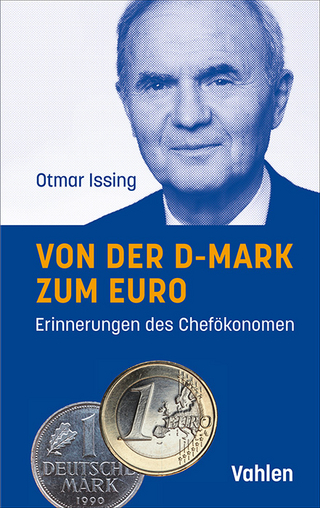
Open Issues in European Central Banking
Palgrave Macmillan (Verlag)
978-0-333-77913-2 (ISBN)
LORENZO BINI SMAGHI is Deputy Director for International Affairs at the Italian Treasury, Rome. DANIEL GROS is Deputy Director and Senior Research Fellow, Centre for European Policy Studies, Brussels (CEPS), Head of Economic Policy Programme.
Introduction WHO IS IN CHARGE OF THE EUROSYSTEM? Introduction The Decision-Making Process What the Treaty States (and What it doesn't State) The Balance of Power The Risks of a Weak ECB Implementation The Interpretation of the Treaty The Underlying Reasons for Decentralization The Consequences of Decentralization Is Decentralization Sustainable? WHO TAKES CARE OF FINANCIAL STABILITY IN EUROPE? Introduction Preventing Financial Crises The Instruments Financial Regulation in the EU Prudential Supervision Financial Crisis Management Solvency and Liquidity Crises Bailing out Banks in Monetary Union The Lender-of-the-last-resort in Monetary Union Who (in the Eurosystem) should Lend in the Last Resort? Should the Eurosystem be Granted Supervisory Powers? Conclusions Annex: Does Prudential Supervision Interfere with Monetary Policy? ARE EUROPEAN CENTRAL BANKS OVER-CAPITALIZED? Introduction The Eurosystem and its Components A Comparative G-3 Perspective The Liability Side and Overall Size: a Comparison with the US and Japan The Composition of the Asset Side: Foreign Exchange Assets Cleaning the Eurosystem Balance Sheet A Lean Balance Sheet Conclusions WHO GETS THE SEIGNIORAGE? Introduction What is Seigniorage? The Treaty's Provisions The Problems The Agreed Non-Solution Alternative Approaches to Phasing-in Conclusions Annex: Legal Issues Annex: The Distribution of Seigniorage in the Context of the Fiscal Constitution of the EU HOW CAN THE EUROSYSTEM BECOME (AND REMAIN) INDEPENDENT? Introduction The Independence Provided by the Treaty Statutory Independence Functional Independence Economic Independence Personal Independence Measuring the ECB's Independence Against that of Other Central Banks The Limits of Measurement The Potential Threats to the ECB's Independence The Exchange Rate Regime The NCBs' Activities 'Outside' the ESCB Conclusions ... AND ACCOUNTABLE? Introduction Democratic Control, Independence and Accountability The Economics of Central Bank Accountability How toAssess Central Bank Accountability? How Accountable is the ECB? Conclusions CONCRETE PROPOSALS FOR STRENGTHENING THE EUROSYSTEM Introduction Transform the Eurosystem into a True European Central Bank Clarify the Responsibility for Financial Stability Clarify Financial Relationships within the Eurosystem Annexes Tables Figures
| Erscheint lt. Verlag | 5.1.2000 |
|---|---|
| Zusatzinfo | IX, 209 p. |
| Verlagsort | Basingstoke |
| Sprache | englisch |
| Maße | 140 x 216 mm |
| Themenwelt | Wirtschaft ► Betriebswirtschaft / Management ► Finanzierung |
| Betriebswirtschaft / Management ► Spezielle Betriebswirtschaftslehre ► Bankbetriebslehre | |
| Wirtschaft ► Volkswirtschaftslehre ► Finanzwissenschaft | |
| Wirtschaft ► Volkswirtschaftslehre ► Makroökonomie | |
| ISBN-10 | 0-333-77913-4 / 0333779134 |
| ISBN-13 | 978-0-333-77913-2 / 9780333779132 |
| Zustand | Neuware |
| Haben Sie eine Frage zum Produkt? |
aus dem Bereich


